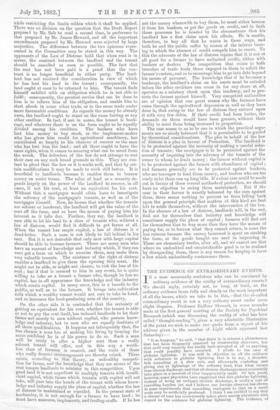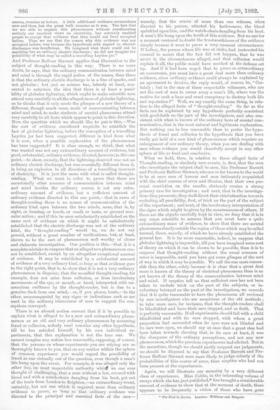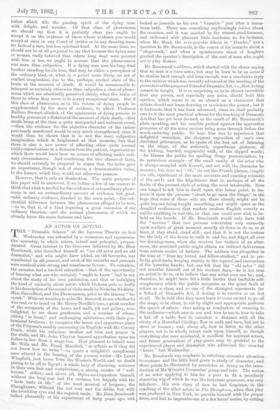THE EVIDENCE OF EXTRAORDINARY EVENTS.
IS a man necessarily credulous who can be convinced by ordinary evidence of the reality of extraordinary events ? We should reply, certainly net, so long, at least, as the
ordinary evidence bears fully and clearly on the most important of all the issues, which we take to be this,—that the so-called extraordinary event is not a very ordinary event under some
slight disguise. Professor Balfour Stewart, in some remarks made at the first general meeting of the Society for Psychical Research (which was discussing the reality of what has been called "thought-reading"), gives a very admirable illustration of the point we wish to make (we quote from a report of his address given in the number of Light which appeared last
Saturday) :—
"It so happens," he said "that there is in science a phenomenon that has been frequently observed by trustworthy observers, but that until very recently has hardly been accepted at all as anything that could possibly have occurred. I allude to the case of globular lightning. It was said in objection to all the evidence with reference to globular lightning, that is to say, a thunder. bolt travelling at a slow rate, and afterwards exploding and giving rise to lightnings of the ordinary kind, that what occurs is an electric discharge, and that all electric discharges must necessarily take place in a moment of time inappreciably small. Of late years, however, some physicists have suggested that this globular lightning, instead of being an ordinary electric discharge, is really a sort of travelling Leyden jar, and I believe one foreign observer has shewa in some experiments that something analogous to that on a small scale may be artificially produced. I think I am entitled to say that a change of tone has consequently taken place among physicists with regard to the evidence for globular lightning. The evidence, of course, romaine as before. A little additional evidence accumulates now and then, but the great bulk remains as it was. The fact that we are able to explain this phenomenon without overthrowing entirely our received views on electricity, has certainly enabled people to accept that evidence that they would not have accepted before. Thus we see that the reason why this evidence was not accepted before, was because the hypothesis with regard to electric discharges was insuffiziont. We imagined that there could net be anything but an ordinary electric discharge; we did not imagine the possibility of what may be called a travelling Leyden jar."
And Professor Balfour Stewart applies that illustration to the subject of thought-reading in this way. There is no more doubt, he says, that the ordinary communication between mind and mind is through the rapid action of the senses, than there is that the ordinary electric discharge is in a line of sparks, and not globular ; but just as science has, latterly at least, con- sented to entertain the idea that there is at least a possi- bility of globular lightning, which ought to make scientific men attend very carefully to all the alleged eases of globular lightning,
so he thinks that it only needs the glimpse of a new theory of a different, though much rarer, mode of communicating between. mind and mind, to make students of mental phenomena attend very carefully to all facts which appear to point in this direction. Now, the question which we should like to pat is this,—Was the sort of evidence considered requisite to establish the
fact of globular lightning, before the conception of a travelling Leyden jar had been suggested, different in kind from what it is now, when a possible explanation of the phenomenon has been suggested? It is clear enough, we think, that what was wanted was not any extraordinary amount of evidence, but good, substantial, ordinary evidence, directed, however, to this one point,—to show, namely, that the lightning observed was not an ordinary electric discharge, but was essentially different from it, in being an explosion in all directions of a travelling reservoir of electricity. It is just the same with what is called thought. reading. What we want in order to prove that there are occasionally other avenues of communication between mind and mind besides the ordinary senses, is not any extra- ordinary amount of evidence, but a sufficient amount of ordinary evidence directed to this one point, —that in cases of thought-reading there is no means of communication of the ordinary kind open between the two minds, none, that is, by sight, or hearing, or touch, or smell, or taste, or general mus- cular action ; and if.this be once satisfactorily established on the same sort of evidence on which it might be satisfactorily established that the electric discharge was not of the ordinary kind, the " thought-reading " would be, we do not say proved, without a great number of verifications, but, at least, shown to be the sort of phenomenon well worthy of closer and elaborate investigation. Our position is this,—that it is a complete mistake to suppose that an alleged new phenomenon can- not be established, except by an altogether exceptional amount of evidence. It may be established by a substantial amount of evidence of a very ordinary kind, io long as that evidence goes to the right point, that is, to show that it is not a very ordinary phenomenon in disguise; that the so-called thought-reading, for example, does not arise from collusion, or from involuntary movements of the eye, or mouth, or hand, interpreted, with un-
conscious swiftness by the thought-reader, but is due to a genuine flash from one mind,— or, if you please, brain,—to the other, unaccompanied by any signs or indications such as are used in the ordinary intercourse of men to suggest the con- ceptions conveyed.
There is an absurd notion current that if it be possible to explain what is alleged to be a new and extraordinary pheno- menon as an old and very ordinary phenomenon by assuming fraud or collusion, nobody need consider any other hypothesis, till he has satisfied. himself, by his own individual ex- periments, that this explanation is not the true one. We cannot imagine any notion less reasonable, supposing, of course, that the persons on whose experiments you are relying are so thoroughly known to you, that on any matter within the sphere of common experience you would regard the possibility of fraud as one virtually out of the question, even though a man's life hung upon the event. For example, it was alleged only the other day, on most respectable authority whicif no one ever thought of challenging, that a man'without a hat, covered with blood. and with a watch-chain dangling from his boot, got out of the tram from London to Brighton,—an extraordinary event,
certainly, but not one which it required more than ordinary evidence to prove, so long as that ordinary evidence was directed to the principal and essential facts of the case— namely, that the senses of more than one witness, when directed to his person, attested his hatlessness, the blood sprinkled upon him, and the watch-chain dangling from his boot. A man's life hung upon the truth of this evidence. But no one for a moment ventured to doubt the trustworthiness of the evidence simply because it went to prove a very unusual circumstance. If Lefroy, the person whose life was at stake, had instructed his counsel to assert that the fact did not happen, that he was never in the circumstances alleged, and that collusion would explain it all, the public would have mocked at the defence set up. And if it had been urged that to prove so extraordinary an occurrence, you must have a great deal more than ordinary evidence, since ordinary evidence could always be explained by an agreement to deceive, the reply would, of course, be, " Cer- tainly ; but in the case of these respectable witnesses, who are not the sort of men to swear away a man's life, where was the motive for such a base and cruel conspiracy to destroy both life and reputation ?" Well, we say exactly the same thing, in rela- tion to the alleged. facts of "thought-reading." So far as the facts can be explained by any hypothesis perfectly consistent with good-faith on the part of the investigators, and also con- sistent with what is known of the ordinary laws of mental com- munication, that is the most natural and legitimate explanation. But nothing can be less reasonable than to prefer the hypo- thesis of fraud and collusion to the hypothesis that you have really got hold of a new kind of phenomenon which requires an enlargement of our ordinary theory, when you are dealing with men whose evidence you would. cheerfully accept in any other sphere of life as final and conclusive.
What we hold, then, in relation to these alleged facts of Thought-reading, or similarly rare events, is, first, that the men who investigate the subject shall be men, like Professor Barrett and Professor Balfour Stewart, who are so far known to the world to be at once men of honour and men intimately acquainted with the chief sources of error and illusion, that their own per- sonal conviction on the results, obviously creates a strong primary case for investigation ; and next, that in the investiga- tions they prosecute, they shall direct their chief attention towards excluding all possibility, first, of trick on the part of the subject of the experiment; and next, of the involuntary interpretation of the signs which might be given by the countenances of others. If those are the objects carefully kept in view, we deny that it is in any sense scientific to assume that you must have a quite extraordinary mass of evidence, to show that there are mental phenomena clearly outside the region of those which maybe called normal, those, namely, of which we have already established. the general law. It is far more reasonable, indeed, to suppose that globular lightning is impossible, till you have imagined some sort of theory on which it can be shown to be possible, than it is to suppose that thought-reading without the usual avenues of sense is impossible, until you have got some glimpse of the sort of way in which it may be possible. We call the one more reason- able than the other, solely because it is clear that a great deal more is known of the theory of electrical phenomena than is as yet known of the theory of the communication between mind and mind. If sceptics tell us that sufficient care has not been taken to exclude trick on the part of the subjects, or in- voluntary betrayal on the part of the investigators, we concede that it is quite reasonable to have the phenomena all reviewed. by new investigators who are suspicious of the old methods ; to take more care, for instance, that the thought-readers shall be blindfolded and have their ears stopped, and so forth. That is perfectly reasonable. If all experiments should fail with a child blindfolded and with its ears stopped, with whom a great proportion had succeeded when its eyes were not blinded and. its ears were open, we should say at once that a great step had. been taken towards showing that, in its case at least, it was the sharpness of the ordinary perceptions, and not any new phenomenon, which thc previous experiments had elicited. But in the meantime, though we should partly suspend our judgments, we should be disposed to say that Professor Barrett and Pro- fessor Balfour Stewart were more likely to judge soberly of the probabilitiee of this source of error, than sceptics who had not been present at the experiments.
Again, we will illustrate our meaning. by a very different class of experiences. Miss Cobbe, in the interesting volume of essays which she has just published,* has brought a considerable amount of evidence to show that at the moment of death, there appears to be frequently a vision of those who have gone * The Peak in Darien. London: Williams and Norgato. before which fills the passing spirit of the dying mau with delight and wonder. Of that class of phenomena we should say that it is perfectly clear you ought to accept it on the evidence of those whose evidence you would accept at once in any Court of justice or in any drawing-room for facts of a rare, but less spiritual kind. At the same time, we should not be at all prepared to say that because the dying man or woman really believed that others long dead were present with him or her, we ought to assume that the phenomenon was more than subjective. If a dying man sees his long-dead brother standing beside him, that may be either a perception of the ordinary kind, or, what is a priori more likely, an act of exalted imagination, due to the, perhaps, excited state of the brain at the moment of death. It would be unreasonable to interpret as certainly otherwise than subjective a class of pheno- mena which are admittedly perceived chiefly when the brain of those to whom they occur is in a very exceptional state. But if this class of phenomena as to the visions of dying people be supplemented by the mass of evidence, to which Professor Balfour Stewart alluded, of the appearance of dying persons to healthy persons at a distance at the moment of their death,—that death being at the time a quite unexpected and unfeared event, —then the evidence for the objective character of the visions previously mentioned would be very much strengthened, since it would then be shown that it is not the mere subjective imagination which is heightened at that moment, but that there is also a new power of affecting other quite normal bodily organisations at a distance from the patient, organisations which there would have been no means of affecting under ordi- nary circumstances. And combining the two classes of facts, we should certainly be prepared to argue that the latter gave an importance, though not, of course, a demonstrative value, to the former, which they would not otherwise possess.
However, that is only an illustration. The main purpose of this paper will be answered, if we induce a few of our readers to think that what is needed for the evidence of extraordinory pheno- mena is not an extraordinary amount of evidence, but good, valid, ordinary evidence, directed to the main point,—the sub- stantial difference between the phenomena alleged to be new, —to be, that is, of a kind requiring a great extension of our ordinary theories,—and the normal phenomena of which we already know the main features and laws.




































 Previous page
Previous page